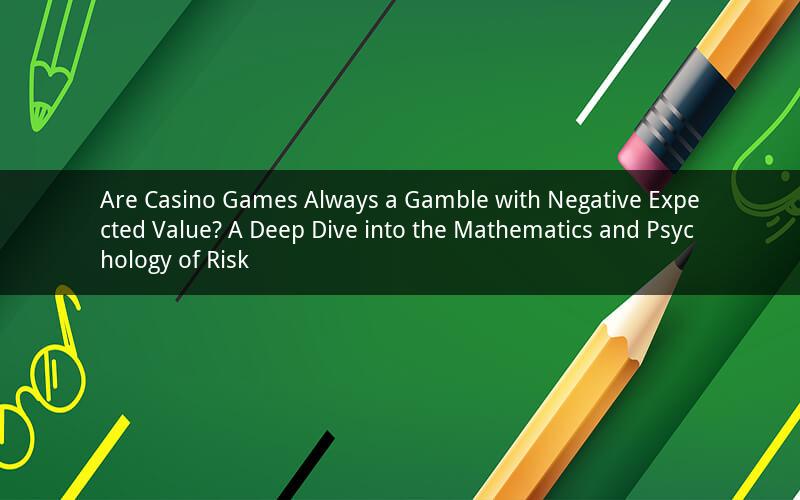
Table of Contents
1. Introduction to Casino Games
2. Understanding Expected Value
3. The Negative Expected Value Paradox
4. The Psychological Aspect of Casino Games
5. The Role of Skill in Casino Games
6. The Impact of Game Design on Expected Value
7. The Social and Cultural Factors
8. Conclusion
1. Introduction to Casino Games
Casino games have been a staple of entertainment for centuries, captivating players with their allure and potential for wealth. From the glitzy Las Vegas Strip to the intimate tables of Monte Carlo, the thrill of the unknown and the chance to win big is irresistible. However, have you ever wondered if the allure of casino games is merely a mirage, a facade that masks a deeper reality? This article delves into the heart of the matter: are casino games always a gamble with negative expected value?
2. Understanding Expected Value
Expected value is a fundamental concept in probability theory and statistics. It represents the average outcome of a random event over a large number of repetitions. In the context of casino games, expected value is the average amount a player can expect to win or lose per bet. For example, in a game with a negative expected value, players can expect to lose money on average over time.
3. The Negative Expected Value Paradox
At first glance, the idea of a negative expected value in casino games seems paradoxical. After all, why would anyone play a game where they are statistically more likely to lose than win? The answer lies in the psychological and social aspects of gambling, which can override the cold, hard numbers.
4. The Psychological Aspect of Casino Games
One of the reasons casino games are so appealing is their psychological design. The lights, sounds, and visual spectacle create an immersive experience that can make players feel like they are part of a grand adventure. Additionally, the intermittent reinforcement schedule of casino games—where players experience brief periods of winning followed by longer periods of losing—can create a sense of unpredictability and excitement.
5. The Role of Skill in Casino Games
Contrary to popular belief, not all casino games are purely games of chance. Some, like poker or blackjack, require a significant amount of skill and strategy. In these games, players who possess the necessary knowledge and discipline can improve their chances of winning and even achieve a positive expected value.
6. The Impact of Game Design on Expected Value
The design of a casino game can significantly impact its expected value. For example, a game with a low house edge may still have a negative expected value if it is played frequently. Conversely, a game with a high house edge can still be profitable for the casino if players play it often enough.
7. The Social and Cultural Factors
The social and cultural context of casino gaming also plays a role in the negative expected value phenomenon. In some cultures, gambling is seen as a form of entertainment, while in others, it is viewed as a serious addiction. The social pressure to "win big" or "have fun" can lead players to ignore the statistical realities of casino games.
8. Conclusion
In conclusion, while casino games are often associated with negative expected value, the reality is more complex. The psychological and social aspects of gambling can override the mathematical probabilities, leading players to believe that they have a better chance of winning than they actually do. However, for those who approach casino games with a clear head and a disciplined strategy, the potential for a positive experience remains.
Questions and Answers
Q1: Can a player ever achieve a positive expected value in a casino game?
A1: Yes, players who possess the necessary skill and discipline can achieve a positive expected value in certain casino games, such as poker or blackjack.
Q2: Are all casino games designed to have a negative expected value for players?
A2: No, while many casino games are designed to have a negative expected value, some games, such as certain video poker machines, can offer players a positive expected value if played strategically.
Q3: Can the psychological aspects of casino games be harmful?
A3: Yes, the psychological aspects of casino games, such as the intermittent reinforcement schedule, can be harmful. They can lead to compulsive gambling and financial distress.
Q4: How can players protect themselves from the negative aspects of casino games?
A4: Players can protect themselves by setting a budget, understanding the odds, and recognizing the signs of problem gambling. It's also important to approach casino games as a form of entertainment rather than a guaranteed source of income.
Q5: Are there any ethical concerns associated with casino gaming?
A5: Yes, there are ethical concerns associated with casino gaming, particularly when it comes to the potential for addiction and the targeting of vulnerable populations. Casinos have a responsibility to promote responsible gambling and provide resources for those who may be at risk.